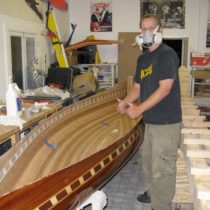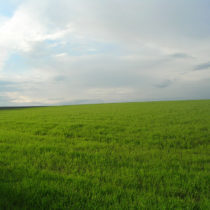Landscape Architecture for Landscape Architects › Forums › GENERAL DISCUSSION › More work ahead?
- This topic has 1 reply, 6 voices, and was last updated 14 years, 9 months ago by
 Roland Beinert.
Roland Beinert.
-
AuthorPosts
-
October 16, 2009 at 2:31 pm #172656
 Ben YahrParticipant
Ben YahrParticipantThere seems to be endless talk about the “end of the recession”. As landscape architects, we should be especially critical of claims that the economy is recovering back to a period of growth, which cannot be sustained fiscally, politically, socially, or environmentally.
Many people are familiar with the concept of peak oil, and Huppert’s curve in the context of production from individual oil fields, and resources worldwide. This article illustrates the concept in a slightly different way, it is well worth the read:
http://www.suburbanempire.com/content/inverting-peak
Can landscape architects contribute to a world where more human effort is required? Can we make a transition to reshaping food production, supply routes, localized manufacturing, transportation, cities, and housing when hydrocarbons are doing less of the work, or are we too engrained in the status-quo?
I tend to believe that individuals who are willing to embrace new challenges and opportunities will have more work (professionally) ahead, but some may not choose to accept the new realities…
October 16, 2009 at 8:16 pm #172672 Roland BeinertParticipant
Roland BeinertParticipantTake a look at this website: http://www.lifeaftertheoilcrash.net/
It’s probably the best site I’ve found on the subject of peak oil.
Landscape architects can contribute to a world without oil, but only when other people are on board.October 17, 2009 at 2:02 pm #172671 Ben YahrParticipant
Ben YahrParticipantObviously as times get tougher every professional even close to qualified will be vying for the same work. Secondly, outsourcing will soon be come unfeasible. New technology is certainly hopeful, and cheaper labor costs in our nation are inevitable. I’m just hoping that landscape architects can be at the forefront in addressing these changes. I think its awesome that the APA has a food planning contingent. I don’t see much movement by LAs at high levels in this direction.
The main implication of the article that I didn’t mention was the requirement of relocalization. You are correct that landscape architects are not qualified to make policy decisions about supply chain management under the current global system. But under a localized system, a landscape architect could be integral in laying out small farm centered communities, organizing supply, production, and trade areas; somewhat along the lines of TND. This optimistically assumes there will still be financial resources available to redesign and retool…
October 17, 2009 at 3:28 pm #172670 Ben YahrParticipant
Ben YahrParticipantYour response has nothing to do with the article that was linked. So to lay it out another way: our “economy”, every economic indicator, and our contemporary society is based on the premise of cheap oil, and the concept of growth utilizing a finite resource. Eventually the cost of oil will rise enough that it cripples our contemporary understanding of economics (which is falsely based on assumptions of the industrial era rather than the entire history of civilization).
Encouraging people to continue “consuming” stuff that they don’t need is all fine and dandy, until the percentage of the workforce that is unemployed rises to a level that cripples the system from the other direction.
The concept of wealth is indeed an interesting one. One could argue that wealth is 100% tied to energy and the ability to get things done. The above linked article states that it is entirely possible that simply pouring more money or energy into the current system will be fruitless. The ability to get things done will need to come from people rather than hydrocarbons. Hence preparing people to at least understand the system they live in, and the ways in which it will likely change is much more beneficial in the long run than encouraging them to keep spending.
The idea that LAs only develop new sites is quite passe. It may be fine in the short term. Expecting to continue that trend as energy costs rise and traditional development becomes less feasible is short sighted. Planning for new opportunities, capitalizing on them, and adapting to new roles will become essential for any professional.
Building without a plan is ridiculous. It is nothing if it doesn’t get planned.
October 17, 2009 at 4:51 pm #172669 Jason TurnerParticipant
Jason TurnerParticipantCan landscape architects contribute to a world where more human effort is required? Can we make a transition to reshaping food production, supply routes, localized manufacturing, transportation, cities, and housing when hydrocarbons are doing less of the work, or are we too engrained in the status-quo?
Back when studying N.L.P. I recall there was an item of faith that held one should never offer a product as ‘New’, if you could help it, as this scared people. ‘New & Improved’ has a far better feel – it is a safer sell (the logic went). The world has never been short of people preaching that we are all going to hell in a hand-bag and we should stock up on tuna and bottled water and move to the mountains. They were seldom heeded.
We tend to be listened to (to some extent) in that we ARE part of the status quo. if we offer a ‘New & Improved’ product offering, which looks at water recycling and management, the opportunity of food security maybe, heck, catch us on a Friday after a liquid lunch and we may even propose a development where vehicles are exiled to the periphery, we have a better chance of being taken seriously than someone who says we should ban anything more complex than an ox wagon and a Dover stove. ‘Softly-softly catchie monkey’ as the saying goes. When we get the model of ‘Village Homes’, Davis as our default approach to Urban Design rather than something we aspire to, we start to turn up the heat a little, with a ‘New & Improved’ version of that, etc, etc…..
To my mind, the most important contribution we can make is to skill up and move ourselves further up the decision making chain as possible, that when the developments are being planned, we are up there putting our agenda first and foremost on the table, that the entire project is viewed through the eyes of sustainability (in all the ways that manifests itself) and landscape architecture. That way we use our position in the status quo to turn the tide.
October 17, 2009 at 7:42 pm #172668 Roland BeinertParticipant
Roland BeinertParticipantI don’t think anyone is actually encouraging people not to take part in the economy, Andrew. I’d even argue there’s no such thing as not taking part in the economy, unless you’re homeless. No one is 100% self reliant. But there’s two ways to look at being green, the cheap way and more expensive way. You have a job. If you ever decide you want to, you can go buy an electric car or a solar powered electric shaver or whatever. I’m living on almost nothing. I need to grow my own veggies and cook my own meals. I need to ride my bike at every opportunity and hold onto my current cell phone as long as I can. But I still had to buy seeds, mulch, flour, my bike, and current cell phone. Saving money is just a form of delaying purchases and buying a wider variety of things with the same amount of money. It is actually a form of looking out for my own self-interest, an important tenet of capitalism. Before we relied on credit, poor people saved money. Go be a good little consumer and buy everything you’ve ever wanted. I don’t have that luxury, and, even when I find a new job, it will take me years to make enough to afford to spend frivilously.
If we are actually willing to act instead of denying the problem, facing peak oil could mean a development boom. We’d need to build better transportation systems, do a lot of infill and build a much wider variety of energy sources.October 17, 2009 at 10:30 pm #172667 Ben YahrParticipant
Ben YahrParticipantGood points Jason. I’m not trying to be alarmist, but clearly there are people who refuse to listen to anything resembling change. A different tone or presentation is required at times.
I also agree that moving up (or making contacts up) the decision making chain is one of the most effective way to have a positive influence on attitudes and policy. I believe that this, along with the excellent points that Roland made about acting at a small level could have a significant positive effect at mitigating the challenges ahead.
October 19, 2009 at 5:50 am #172666 idaParticipant
idaParticipant“Can landscape architects contribute to a world where more human effort is required?”
To answer your question, this article might help-
http://www.core77.com/blog/news/_the_context_of_low_product_how_designers_can_help_articulate_a_new_social_language_by_ann_thorpe_13623.aspOctober 19, 2009 at 1:40 pm #172665 Ben YahrParticipant
Ben YahrParticipantThanks for sharing the link. The author’s conclusion is definitely the point I was trying to raise:
Designers alone can’t bring about a steady state economy, but we can begin to use the economy for sustainable ends, rather than letting the economy use us solely for economic growth. This challenge requires us to simultaneously deal with the daily realities of the high product context (where we typically try to make existing consumerism more efficient), while simultaneously plotting moves towards the low product context.
October 19, 2009 at 2:38 pm #172664 ncaParticipant
ncaParticipant“Anyone who has climbed a hill or a mountain knows that it is usually easier to go down than up as gravity works with you and more energy seems to be expended on slowing down then walking.”
I started skimming after about this point. Anyone who has ever actually climbed a mountain knows going down can be a lot more painful than going up.
Overall, I thought the article was thought-provoking, but lacking a definitive practicable solution.
It’s too bad the discussion has become quasi-personal. It would have been interesting to read some other perspectives.
October 19, 2009 at 3:06 pm #172663 Ben YahrParticipant
Ben YahrParticipantYup, the original article definitely lacked a practical solution, it was simply a different way of looking at the challenges ahead. I was hoping the discussion would flush out some more solutions. There is no single solution, but more a thought process of planning that could be brought to many different types of projects. Possible solutions that were brought up were becoming active in designing functional relocalized communities, reducing one’s own impact, working with or becoming a policy maker, and truly applying the concepts of sustainability to any projects. All a good start.
The challenge is not one that can be addressed by the profession of landscape architecture per se (nor was I suggesting that), but it can be solved by individuals becoming aware of the big picture- a trait that all good landscape architects possess. Through positive discussion, individuals; and eventually society, may be able improve the situation.
October 19, 2009 at 3:32 pm #172662 ncaParticipant
ncaParticipantI can agree with that. I need some time to think about the article a little more.
October 19, 2009 at 5:47 pm #172661 ncaParticipant
ncaParticipantI’m particularly interested in how a designer approaches the issue of pending change? Are there practicable ways a designer can both influence and adpat to a changing culture/market/climate?
Should the designers role always/ever be reactive?
October 19, 2009 at 7:37 pm #172660 Roland BeinertParticipant
Roland BeinertParticipantAndrew,
You’re assuming some of us to be more extreme than we actually are (something which we are all probably guilty of on this forum, including myself). I don’t think Ben or anyone else is arguing that everyone should grow their own food. We are arguing that it will be harder for us to have a lot of our food grown several hundred mile away. I just think it’s important to have more small, local farmers, and don’t think it’s a crime for homeowners to grow a portion of their food. Even if everyone had their own vegetable gardens, most people would not choose to be farmers and would not have time to grow all their own food. Just enough to not spend all their money on food. The economy can adapt as long as we give it enough time.
Also, no one is arguing that we should give up using energy altogether. “Giving up” implies we would have a choice. I think what we are arguing for is actually what you mentioned you support (planning with conservation in mind), so that the rug isn’t pulled out from under us when gas prices start to rise.
When do you start to conserve? To me conserving implies not using something up all at once and choosing how you use that resource on very carefully. Do you do that at the last minute? If we want to maintain our quality of life as much as possible, we need to start planning for both conservation and a post-oil economy now. Twenty, thirty, forty or even fifty years is not an very long time to restructure an entire economy. If I live as long as my grandmother, fifty years is within my lifetime. Even Dick Cheney admits peak oil will happen.October 20, 2009 at 7:57 pm #172659 Ben YahrParticipant
Ben YahrParticipantYou are making two points. One is identical to mine, one is extremely contradictory.
First, we can and do make the best possible choices within their scope of work. There are more small things we can do as individuals and professionals. Eventually the talk and philosophy becomes applicable to everyday life. I hope sooner than later.
Second, oil supply. You make some bold claims discounting the scope of the threat. Please supply citations to back up your claims that simple supply/demand/contemporary economics will solve the problems of peak oil.
There is a significant amount of evidence available pointing to substantial hardship as oil supplies tighten. Furthermore, this is not a situation where a single solution will solve all or even any of the complications in a short time. Refer to “The Hirsch Report” as a starting point: http:\http://www.netl.doe.gov/publications/others/pdf/Oil_Peaking_NETL.pdf
I am not advocating any policy changes, mandatory measures, or any disruption to the happy suburban way of life. This discussion was envisioned as a theoretical exercise (purely talk and philosophy) of possible tasks that the skillset possessed by LAs could meaningfully complete in a post peak oil scenario. Thinking about such situations could inform decisions made today in an effort to “do our part” as engaged citizens. As is often the case here, the discussion turned emotional and unproductive.
-
AuthorPosts
- You must be logged in to reply to this topic.

